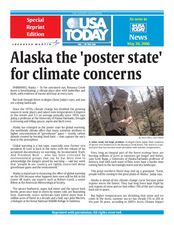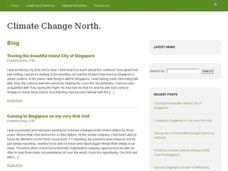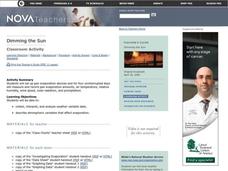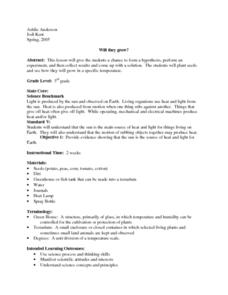Curated OER
Solar Energy: Become a Sun Chef!
Young scholars design and construct a solar cooker. They use the Internet to research solar collectors and the process of changing light energy into heat energy.
Curated OER
Temperature Changes in the Atmosphere
Students analyze how different variables affect atmospheric temperature. They construct a model of an ecosystem, select a variable, design and conduct an experiment, and record and analyze the data to present to the class.
Curated OER
Mission Planning: Earth/Mars Comparisons
Students compare and contrast conditions on Mars to those on our own planet, specifically, their local or regional environments. The physical characteristics, the atmosphere, and other astronomical data is considered.
Curated OER
Acid Rain Keeps Falling on My Head
Pupils examine the pH level of rain water in their local community. They locate each location on a map. They analyze the data and draw conclusions.
Curated OER
Alaska the 'Poster State" For Climate Concerns
Students read an article on Alaska and its climate concerns. For this research lesson students create a poster that contrasts Alaska then and now that pertains to climate change.
Curated OER
Classification of Clouds
High schoolers view progressive slides of cloud formations and identify which type of cloud is shown as it forms. They estimate the cloud's height while viewing each image.
Curated OER
Career and Personal Planning
Students visit Conservation in Action web site to watch three video interviews with Vancouver Aquarium researchers, complete Careers in Conservation worksheet, research threats facing species featured on Conservation web site, and create...
Curated OER
Climate Change Challenge
Students explore the issue of climate change through participation in an interactive game show. They explore climate change issues in the news. Students write and discuss their own questions about climate change.
Curated OER
Soil In The Amazon
Students grow plants in soil representing that found in the Amazon basin. They compare results to plants growing in fertile soil and soil fertilized with leaf compost. Students chart, average and graph plant growth by height.
Students...
Curated OER
What Makes you Hot?
Students manipulate different variables in a model and make inferences about the temperature on Earth. In this heat lesson students calculate the blackbody radiation of an object at a certain temperature.
Curated OER
Dimming the Sun
Students collect, interpret and analyze weather variable data. They describe atmospheric variables that affect evaporation. Students create graphs and analyze the information collected.
Curated OER
Calculate Your Contribution
Young scholars assess the environmental impact of their transportation choices. They keep a transportation journal and use a website to calculate vehicle emissions for themselves and their class. They evaluate their transportation choices.
Curated OER
Heat Transfer and Pollution
Students perform computer simulations on air dispersion. In this chemistry instructional activity, students calculate energy transfer based on specific heat and temperature change. They explain the causes of smog.
Curated OER
The Kyoto Protocol: What Should We Do?
Students examine why the United States did not ratify the Kyoto Protocol. They develop their own opinion on the Protocol and share them with the class. They also discover how scientific data may be organized to use in a debate.
Curated OER
Will they grow?
Third graders plant seeds and see how they will grow in a specific temperature and are questioned about different environments and how they think crops would grow there. They form a hypothesis, perform an experiment, and then collect...
















